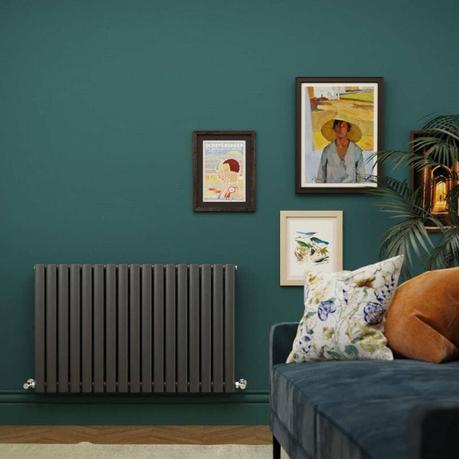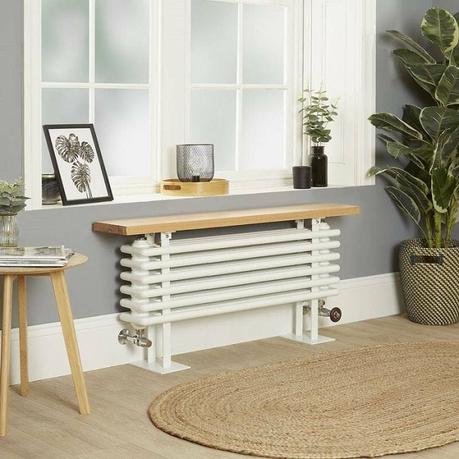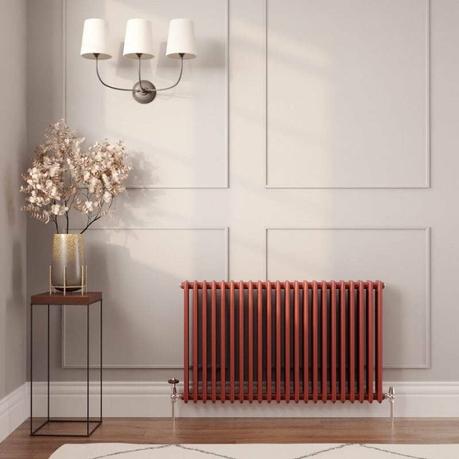Finding the right temperature for home radiators
The efficient performance of a home heating system is of paramount importance to a UK household, especially so as a cost of living crisis continues to lead us to try any inventive ways possible to cut energy bills.
So, when looking for areas to enhance the performance and efficiency of your heating, zoning in on your home radiators is generally a good place to start.
Are you wasting energy, and therefore money, with your hot water radiators operating at a higher level than they need to be?
We’ll explain in this article what the optimal temperature should be for your radiators, and what to do if they are getting too hot.

What can happen if radiators get too hot?
Of course, we want our radiators to be hot to keep us nice and toasty in our humble abodes. But how hot is too hot, and what can happen if your radiators have gone into overdrive?
First things first, there is an obvious hazard to the likes of young children if radiators are too warm to the touch. For all that you can tell your toddlers not to go near your radiators, they’ll see that as a challenge rather than deterrent if they’re anything like mine, so you need to be wary of a potential scalding risk.
What’s more, in addition to possibly causing injury, an overly hot radiator can also lead to furniture and fittings becoming damaged, especially if placed in direct contact. Think of a settee rubbing up against an extra-hot rad – there’s a chance that discolouring and wearing down can occur over time, and in any case, it definitely isn’t the best practice for any flammable fabrics to be positioned to touch a component at such a temperature.
But how hot is too hot for radiators?
What temperature should your radiators be?
Several influencing factors will mean that different radiator temperatures are right for different households.
The size of the room the radiators are fitted within, as well as who inhabits the space, the time of year and purpose of a particular room can all play a part in dictating how hot your radiators should be. For instance, a kitchen setting might lead you to set your radiators at a lower temperature than in a hallway due to alternative heating vices like the cooker being in use. And obviously, the colder winter months might see you turn your radiators up to a higher level to stay comfortably warm, especially so if there are young children in the home.
As a general rule of thumb, radiators are recommended to operate at between 18 and 22 degrees to deliver a pleasant ambient temperature; our BTU Calculator can help you select the right designer radiator for a specific space based on this guidance.
Some fluctuations can be expected and even encouraged in certain circumstances, but advice from the government’s Health and Safety Executive states that any radiators with a temperature of 43 degrees or more pose a significant health hazard, especially to children and the elderly. Direct contact with radiators working at such a temperature or above can cause serious burns near instantly, and in extreme cases, can prove potentially fatal to vulnerable people.

Why do radiators get too hot?
There are a multitude of reasons why radiators can get too hot. Listed below are some of the most common causes of radiators being too warm and handy hints on how to combat the problem…
Thermostat not working
A thermostat is used to regulate the temperature of a household, whether they be in the form of a traditional dial or a more modern digital thermostat device that can control and adjust temperature remotely. Thermostats will take account of the air temperature of the room in line with the preferred temperature you’ve specified, and liaise with the home’s central heating system to maintain that level of heat.
When in full working order, thermostats will communicate with the central heating when they detect that the temperature is either above or below your pre-set designated level.
However, if the thermostat is malfunctioning, it could fail to flag up an excessive temperature and as such, not inform your boilers that less hot water is required for your radiators. It could also potentially affect the temperature of the water that emerges from your hot water taps, leading it to be scalding hot.
You should seek the assistance of a professional plumber or heating engineer in the first instance if you suspect your thermostat to be working incorrectly. As well as potentially leading your home to be uncomfortably warm, a faulty thermostat could also catalyze a domino effect on other appliances on the same heating network, so it is best to address the issue as quickly as possible.
Thermostatic valves not working
If thermostatic valves (or TRVs) adorn your hot water radiators, then the prospect of a stuck pin within the valve could contribute towards radiators getting too hot.
Typically, TRVs can decipher the level of warmth in a room and shut off to prevent any further water flowing into their radiators when the optimal temperature has been reached. But if the contained pin is stuck in the ‘on’ position, the valves will allow more hot water to enter the radiator even when the preferred heat emission gauge has been reached or surpassed.
Thankfully, you can check if your thermostatic radiator valves are causing your radiators to get too hot in DIY fashion. Simply take the cap off the valve and closely inspect the pin. You can use some pliers to free the pin if it has become lodged in an ‘on’ position, or simply opt to invest in new thermostatic valves altogether.
Diverter valves not working
For households that rely on a combi boiler for their central heating, diverter valves are used to temper the flow of hot water to taps and radiators around the property.
The way it works is to distribute hot water on a needs must basis. For instance, when a hot water tap is turned on while the central heating system is in use, the diverter valve will direct just enough hot water from radiators to the tap in question. This guarantees a very efficient performance as water is transported exactly where it is needed at exactly the right time, so no excess is wasted.
Given that diverter valves work by opening and closing with great regularity, it is unsurprising that they can prove susceptible to dirt and debris infiltrating them over time, which can eventually cause the components to clog up. When this happens, the valves can transport more water than is needed to radiators which could cause them to become overly hot.
Again, if you notice this to be the case, you should immediately consult a heating engineer or plumbing professional to tackle the problem as it is not a simple remedy that can be completed by do-it-yourself means.

Get the best heating advice from BestHeating
You should now be fairly well versed in the reasons that could cause your radiators to be too hot, how to check for potential issues and what to do if you do notice overly hot radiators. But if you would like any further help surrounding this, or any other home heating posers, be sure to make use of the resources on offer from BestHeating.
Our Advice Centre is brimming with helpful heating guidance, or you can get in touch with our friendly team to find out more. We can be reached in the comments section below, or via Instagram, Facebook or Twitter.
Got a radiator or heating question?

You can find a range of helpful answers to hundreds of common home heating questions on our FAQ pages.
Click the link or tap the image above to ask a question of your own!

